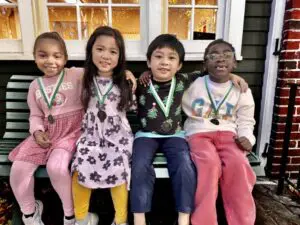Teaching Gratitude Beyond ‘Thank You’: Simple Daily Practices for Families
Making Gratitude Real for Your Family
November naturally brings conversations about thankfulness, but building a genuine sense of appreciation helps children develop integrity, compassion, and respect that lasts all year long.
So, how do you teach gratitude in a way that actually sticks? The secret is making it practical, fun, and part of everyday life. Let’s explore some simple family gratitude activities your family can practice together, no matter your child’s age.
Gratitude Practices by Age Group
PreK-Kindergarten: Starting Small and Simple
The Gratitude Jar
Grab a mason jar and some colorful paper. Each day, help your child draw or dictate something they’re thankful for. Even a simple “I’m happy we have cookies!” counts. At dinner, pull out one slip and talk about it together.
Thank You Walk
During your next neighborhood stroll, ask your child to point out things that make them happy—a friendly dog, pretty flowers, or the playground. This helps them notice the good things around them naturally.
Grades 1-3: Building the Habit
The 3-Good-Things Routine
At bedtime, ask each family member to share three good things from their day. Keep it casual—maybe one was lunch with a friend, another was finishing a tricky math problem, and the third was just a cozy blanket. This simple practice builds awareness without feeling like homework.
Gratitude Helper Chart
Create a chart where kids can add stickers when they notice others helping them. When they reach five stickers, they get to plan a “thank you surprise” for that person—maybe drawing them a picture or helping with their chores.
Grades 4-6: Deepening Understanding
Gratitude Letter Challenge
Once a week, have your child write a short note to someone who’s made a difference in their life—a teacher, coach, grandparent, or friend. They don’t have to send them all, but actually delivering a few teaches them how powerful appreciation can be.
Community Appreciation Project
Encourage your child to notice people in your community who help others—mail carriers, crossing guards, grocery store workers. Together, create thank you cards or small treats to show appreciation for their work.
Grades 7-8: Making It Meaningful
Gratitude Journal with a Twist
Instead of just listing good things, ask them to write about a challenge they faced and what they learned or appreciated from it. This builds resilience and helps them see growth in difficult moments.
Pay It Forward Plan
Have your teen identify something they’re grateful for, then create a plan to give back in a related way. If they appreciate their music teacher, maybe they teach a younger sibling an instrument. If they love their sports team, perhaps they volunteer to help younger players.
Reflection Conversations
Set aside time for real talks about what gratitude means. Ask questions like “What’s the difference between saying thanks and feeling thankful?” or “How does showing appreciation change relationships?” These discussions help teens develop their own values.
Your Gratitude Challenge This November
Ready to give it a try? Pick just ONE activity from this list that fits your family’s style. Meanwhile, commit to doing it for the next two weeks. You might be surprised how quickly it becomes a natural part of your routine.
Remember, teaching gratitude isn’t about creating perfect moments or forcing your kids to feel a certain way. It’s about creating small opportunities for them to notice, appreciate, and express thanks in ways that feel genuine.
When children learn to truly appreciate their world and the people in it, they become more confident, compassionate, and purposeful individuals, exactly the kind of people who are ready to take on life.
What gratitude practice will your family try first? We’d love to hear about your experiences!
At Delphi Academy of Boston, we’re proud to provide an education that develops strong readers, problem solvers, and independent learners. Our character-focused approach helps students build integrity, compassion, and independence—skills that last a lifetime. Learn more about our program at delphiboston.org

